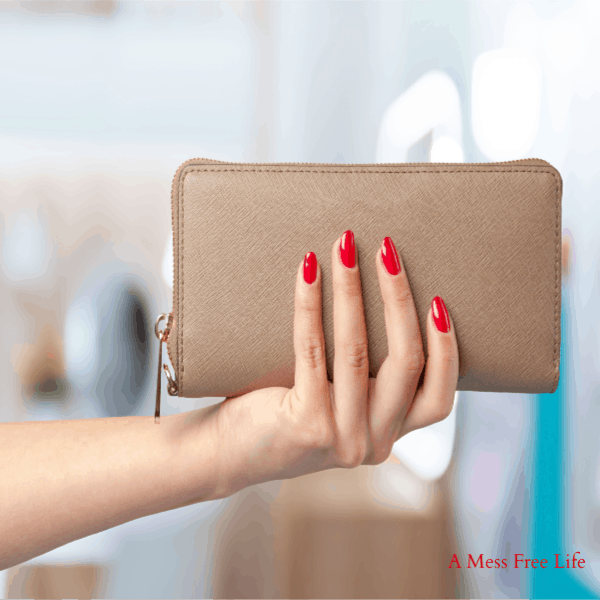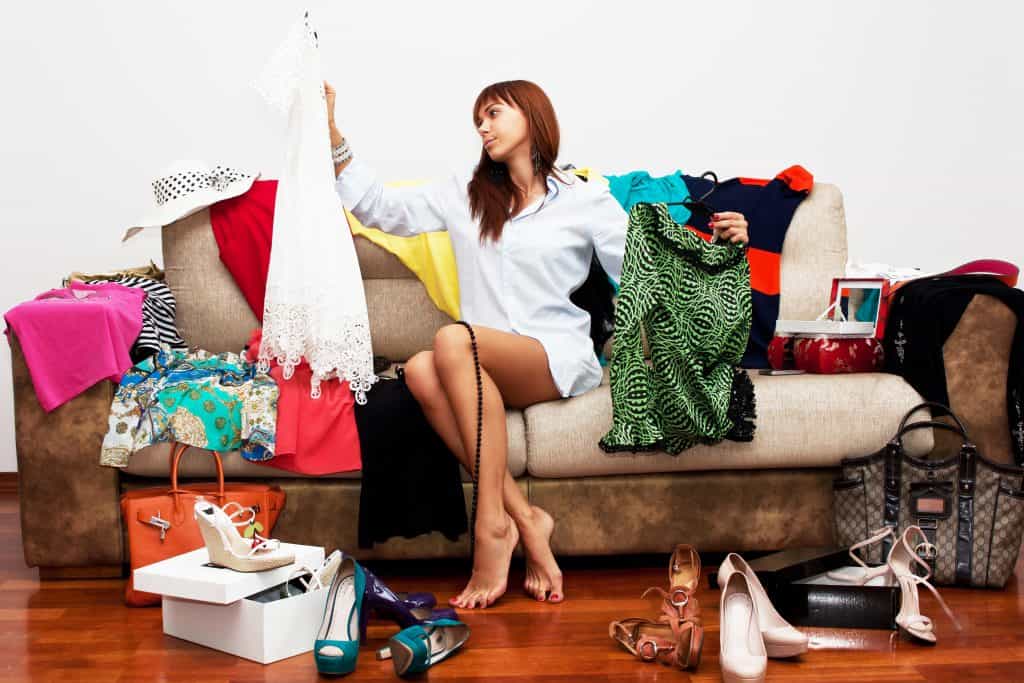A Mess Free Life may collect a share of sales or other compensation from the links on this page.
Is being a shopaholic a real thing?
We hear the word “shopaholic” often, usually used in jest to someone who enjoys shopping. After a day at the mall and several bags in hand, we may tell someone they’re becoming a shopaholic as we laugh off how much they purchased.
But is a real thing? Is it an actual condition? Is it an illness like alcoholism or drug addiction that requires professional help?
The answer is . . . yes. It is a condition; an addiction that can damage someone’s life just like any other addiction. It can cause financial ruin. And not just to the person with the addiction, but to the people around them as well.
If you’re married to a shopaholic and share credit cards or have loans together, your credit is being damaged as well. You’ll find yourself being responsible for their debt.
What causes someone to become a shopaholic and allow their spending to become out of control? Do they just start spending and can’t stop, or is there more to it than that?
I definitely consider myself a recovering shopaholic.
Although I don’t have all the personality symptoms described below, I certainly have many of them to some degree.
Over the years I learned to work on many of these traits so that I could strengthen my self-worth and not rely on shopping as a mechanism to make me feel better.
It’s why I developed my EMBRACE Lifestyle Training Program.
There wasn’t anything out there that helped people who struggle with emotional spending and addiction to learn how to switch off shopping and turn on more loving and kind behavior towards oneself and to fix the issues that propelled one to shop in the first place.
I’d love for you to take a look at the mini-workshop that’s a precursor to the full-blown course.
Just sign up below!
Let’s take a peek into the mind of a shopaholic to see what brings the addiction on in the first place.
Table of Contents
WHAT IS A SHOPAHOLIC AND HOW CAN YOU SPOT ONE?
These personality types can be more susceptible to becoming a shopaholic:
THEY SEEK APPROVAL
Most people who are shopaholics are kindhearted and empathetic to others. They are often lonely and shopping provides interaction with salespeople. When they purchase gifts for other people, it allows them to feel loved and accepted for that gift.
THEY HAVE LOW SELF ESTEEM
Shopping allows them to improve their image of themselves when they purchase items that fit into the image of who they want to be. But low self-esteem might come on after becoming a shopaholic instead of causing it. When debt is rising and they can’t manage it, they may begin to have feelings of worthlessness and inadequacy.
THEY LACK EMOTIONAL WELL BEING
People who suffer from anxiety and depression often fall into a black hole of shopping. It’s a way to lift their mood, even if it’s just for a short time. Those moments of feeling down and needing to feel better are the times they go to the mall searching for an infusion of joy by buying things they don’t need.
THEY ARE MATERIALISTIC
Their self-worth is tied to what they own, how they dress, and what kind of car they drive. They want to have the best of everything, even if it’s something they don’t need, to impress others and feel good about themselves.
THEY STRUGGLE WITH IMPULSE CONTROL
Impulses are natural, and it’s sometimes hard to avoid temptation. We’re all guilty of impulse purchases from time to time. But shopaholics struggle with it daily and often have trouble controlling impulses in other areas of their life as well. They are overwhelmed with the desire to purchase something they want, even if they don’t need it.
The addiction to shopping is so widespread there is now a Shopaholics Anonymous organization. Shopaholics Anonymous says there are several different types of this addiction including:
- Compulsive shopaholics who shop when they are stressed or feeling emotional distress
- Shopaholics who want to appear better than they are by being seen as a big spender
- Trophy shoppers who are always shopping for the “perfect” item
- Bargain shoppers who get a mood boost over a great sale, even if they don’t need the items
- Collectors who want an item in every color or want every piece of a set
- Bulimic shoppers who are continually purchasing and returning items
Just like any other addiction, shopaholics become addicted to shopping because of the feeling they get from it. Purchasing new items gives them a high, much like drugs or alcohol.
How do you know if you or someone you love are a shopaholic?
EIGHT SIGNS YOU OR SOMEONE YOUR LOVE IS A SHOPAHOLIC
- Purchasing items you don’t need or didn’t plan to buy
Shopaholics have a hard time walking away from a good deal or something they really love. They find themselves making a lot of impulse purchases. They may find themselves obsessed with one particular category, like designer shoes or handbags, but that doesn’t make the purchases more rational if it’s something they didn’t need to begin with. The good news is you can learn how to outsmart the impulse buy?
- Unopened or unused items
Is your closet full of clothes that still have the tags on them? Shoes that have never been taken out of the box? Maybe you’re obsessed with buying kitchen gadgets and appliances that you’ve never used. If you’re purchasing items that you don’t need, and never use, it’s likely that you were just filling an emotional need when you made the purchase. Emotional needs are complex but you can find freedom from emotional spending.
- Indulging to feel better
If you find yourself frequently heading to the mall after an argument, a bad day, or feeling bad about yourself, you might have an addiction. One that needs to be fed by shopping for things you don’t need. Indulging to feel better fills an emotional void. If you’re always seeking comfort food when you’re feeling down, your indulgences may lead to shopping sprees as well.
- Feeling bad about your purchases
Shopping may feel great while you’re doing it, but what about after? When you take all those bags home and start unpacking your purchases, do you feel remorse for indulging in purchases you can’t afford and don’t need?
- Shopping gives you a high
Shopaholics often feel a rush of adrenaline when they shop. Dopamine, a brain chemical associated with pleasure, is released in waves when you find an item you want and consider purchasing it. This “feel good” emotion can be addictive; a feeling you want to repeat over and over.
- Hiding purchases
If you’re constantly hiding purchases in the closet or turning your computer monitor away from others when you’re shopping online, this is a sign you’re doing something you know you shouldn’t be. You may be feeling remorse or guilt about your shopping habit.
- Not shopping makes you anxious
If you’re feeling on edge because you haven’t gotten your shopping fix for the day, there’s reason for concern. Filling that need becomes a necessary part of your day. And if you can’t get to the mall, you resort to online shopping to fill the need instead. Whatever it takes to charge a new purchase. If you’re feeling withdrawal when you don’t shop, it’s time to seek help.
- Mounting debt
If your shopping causes you to max out your credit cards and open new ones for additional lines of credit, then your problem is out of control. The mounting debt will not only cause financial stress for you but also your family if their names are on your cards. It can be tempting to lie or steal to avoid having your problems found out.
Being a shopaholic is certainly no laughing matter; it’s a serious issue that needs to be dealt with before it goes too far and causes permanent, lifelong financial and relationship issues. If you can relate to any of the above symptoms, even if only a little, it’s time to kick the habit and transform your shopping ways.
If your problem isn’t too severe yet, you can attempt to fix it on your own.
- Find something else to do with the time. Workout, read a book, spend time with friends or family. Anything that doesn’t involve shopping.
- Figure out what causes you to want to shop. Do you only shop when you’re feeling down? Do you shop to celebrate? Whatever your trigger is, find something else to do when it strikes. Go for a walk, call a friend, bury yourself in a book, or enjoy your favorite treat. Replace shopping with another outlet for your trigger.
- Reduce or remove temptation. Limit your trips to the mall, freeze your credit cards until they’re paid off, only carry as much cash as you can afford to spend. If you need to go to the mall, make a list of what you need and estimate the cost of each item. Then take only the amount of cash you need to cover your list.
If your problem persists and these suggestions don’t help you to stop shopping, it’s time to seek help.
- Find a local chapter of Shopaholics Anonymous and go to a meeting.
- Talk to your family and friends about your problem and ask for their support.
- Seek professional counseling or coaching to help you understand why you’re addicted to shopping and what you can do to stop.
Depending on how far your issue has gone before getting help, you may need to consider options such as filing bankruptcy, getting an extra job to pay off debt, and rebuilding your credit.
CONCLUSION
Shopaholics become addicted to shopping for reasons other than the satisfaction of buying new things. There are usually emotional or mental issues that lead to this addiction and they need to be taken seriously. Addictions usually arise from issues of low self-esteem, anxiety, depression, and a number of other issues. It’s important to find the root cause of the addiction in order to prevent a relapse.
Being a shopaholic is a real thing, but it can be treated with professional help, support from friends and family, and a willingness to overcome it.




